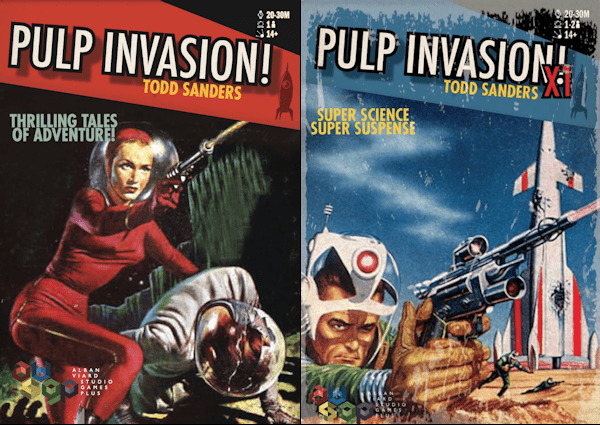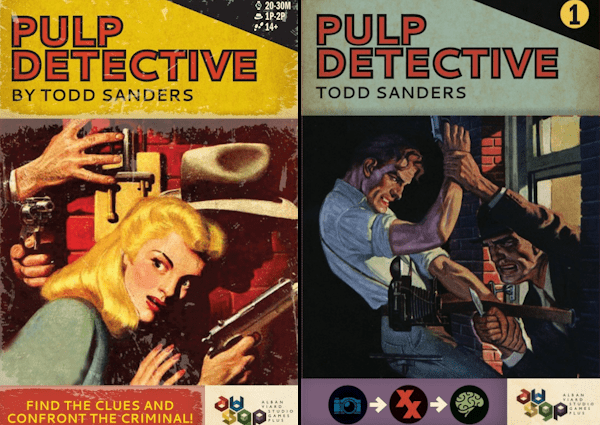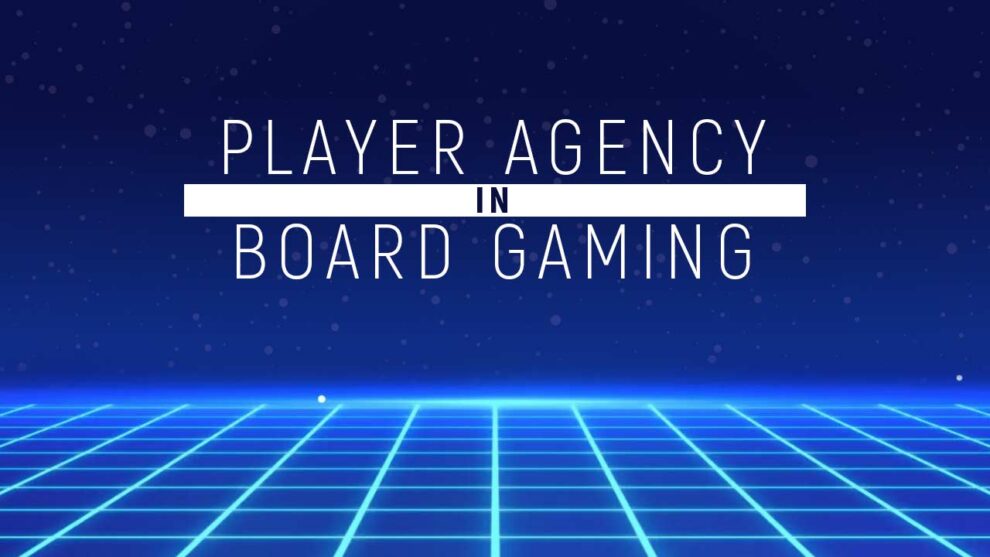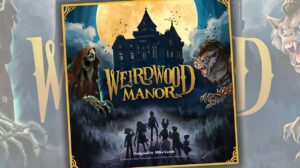A few years back I was wandering through various campaigns on Kickstarter (as I am wont to do) and I saw a pair of images that were right up my alley. The images were sci-fi but of the old 1930s to 1950s variety. The sort of images that invoke Buck Rogers and Flash Gordon.

Pulp Invasion! I read the description of the game and saw that it was a solo affair. I decided to get two copies: one for me, and one for my friend, Steve (Steve loves solo gaming). I looked around on BoardGameGeek and I saw that the designer, Todd Sanders, has done a few other small print run games, and another series using the pulp-style artwork he had acquired the rights to. This one dealt with the old Gumshoe genre.

I loved it! I searched around and I located the base game for Pulp Detective, all three expansions, the slip-cover to hold all of the boxes together (like a set of books), and the puzzle-piece playing board for the combined experience.
These games came about after Mr. Sanders acquired the rights to a whole bunch of pulp magazine covers and interior illustrations. In other words, this is the real deal! These are not modern artists mimicking the pulp era styles, these are authentic pulp era pieces. And they are beautiful!
I have written reviews of these games, so be sure to check out Pulp Detective and Pulp Invasion there. What I want to talk about here is something I noticed while playing these games.
A Straight Line
As I said in my reviews of these games, I like them. I think Todd Sanders does a good job of invoking a developing story as you play the game. But what is lacking is player agency.
In Pulp Detective you can choose which of the investigation cards to attempt (and with that comes some idea as to what the rewards might be), but this is hidden and imperfect information. You know what kind of card it is, but not if this card will give you the reward you need, or what sort of challenge you are about to be subjected to. When attempting to deal with the challenge of a card, you have no choices at all: the time in the game tells you which challenge line to deal with, and the dice can be as giving or unforgiving as they may. You can try to adjust things by choosing which dice to roll, but we all know how whimsical dice can be. In my experience, the game can be won about 10-20% of the time (e.g., the more expansions included, the better your chances become), but even when you win the game you have no real sense of accomplishment because it was all the luck of the dice.
In Pulp Invasion you are attempting to manage a bag of cubes so as to maximize your chances of pulling a yellow (super weapon). But the game has you putting in and drawing cubes all the time in ways that are entirely out of your control. There is no management truly happening! If you happen to draw a super weapon cube on each of your first few planetary explorations, you will win no matter how you fumbled your way through the threats laid before you. If you happen to draw none of the super weapon cubes on your various planetary explorations, you will lose no matter how expertly you dispatched those threats. Hell, draw all but one of those super weapon cubes, and never see the last and you will lose. Draw the wrong color cube when evading a threat, and you could find your Diplomacy drop to zero and lose the game that way. It is all, literally, luck of the draw. The win percentage for this game is somewhat lower than it is for Pulp Detective.
Do not get me wrong: this is not an issue limited to Todd Sanders, and it may not even be an issue at all. Agency is not always needed. Many classic games have been quite successful without it, such as:
- Parcheesi (and others in that family)—the entire category of roll-and-move games tend toward having no agency. You roll the die, and you move that many spaces. In these games, the only real agency involved is sometimes being able to choose which of your pieces is going to move.
- Life—do not be fooled by the seemingly important choice made at the start of the game (whether or not to go to school), or the fact that the board forks a few times. Those are the only choices you have! Beyond that, this is just another roll-and-move game on a railroad to what the game designers desire for you. Don’t want to get married? Tough. Have a lousy, low-paying job? Unless a space says otherwise, you are stuck with it. And so on. This category includes such cash cows as Monopoly.
- Yahtzee—the ability to re-roll a few dice each turn gives an illusion that you have some control. But the control in this game is entirely in the hands of fate (well, chance really). Get a Yahtzee or two, and you are already in the driver’s seat for a victory. This category includes to varying degrees other games such as King of Tokyo, Formula De, Shut the Box, God Dice, Tenzi, or just about anything in the Steve Jackson Games’ Random Fun Generator collections.
- Children’s games that exclude agency on purpose, such as Candyland or Chutes and Ladders. These are not games, they are activities. Think about Candyland for a moment. There is a story I once read of a man recalling the fact that his little sister liked this game when they were kids. She wanted to play and he had other things he wanted to do. So he told her he would play, but that he was busy, so she would need to draw his cards and play his pawn. That was acceptable to her many times. He was able to continue to do what he wanted, his sister got to play Candyland, and she would come over to him after to let him know if he had won or lost.
If these two Pulp games could find better ways to add meaningful decision space, they would be at the top of my list of games. They are fun, engaging, and clever! As it stands, they remain middle-of-the-pack (along with King of Tokyo and so on). If you like the idea of some pulp-era fun, and can deal with a lack of agency, then I can certainly recommend Pulp Detective and Pulp Invasion. Likewise, if the lack of agency is not a deal breaker, I can recommend most of the games in my examples above. However, if you want more control over your wins and losses, then look around Meeple Mountain—we have a lot of games that are rated quite highly (4-stars, 5-stars).
A game can certainly be successful, beloved, and even very good without having much agency. I love most all of Todd Sanders game designs! But I believe that some (many? most?) modern gamers would like to see agency as a significant element in some (many? most?) games they play. I certainly fall into that category.











This is a really good topic, because I think the view of player agency among board game enthusiasts may be more subjective than we think. If we try to generally define it as the “degree of freedom a player has to make decisions and impact the game world through their actions (Wiki’s words, not mine, but a decent place to start a discussion), I think the way in which this is accomplished is as important as the presence of the decision capacity itself. Some of my favorites are:
The Strategic Action cards of TI4- pick a great action for your round, but only have access to a less powerful version of actions selected by your opponents (or perhaps no access at all if that card is not picked);
Multi-use cards, like in Luke Laurie’s Cryo, Holek’s new SETI and a growing number pop other titles. This is a really engaging mechanism because it allows the player to prioritize what’s important to them “right now”;
Various deck-builders (I’m looking at you Dune: Imperium) that allow the player to optimize a particular strategy via card filtering
What kind of mechanisms do you think these Pulp games could employ to enhance the player decision space?
Thanks for sharing. 🖖
Thomas Romanelli — first let me say thank you for your comment. I love seeing people engage with my writing.
Pulp Detective and Pulp Invasion are complete, so there is little chance of Mr. Sanders doing anything for these two games to add in the agency I am speaking of. I believe he is currently working on the next in the series, Pulp Romance. Maybe he can put it into that one (crosses fingers). That said, let us assume that we have the Wayback Machine and could help with the design of these games as they were being developed.
I think that Pulp Detective should have leaned into the fact that it has four symbols on six-sided dice, and made it such that some of those icons were harder to get to than others. Then, on the challenge lines, do not set those by the time of day, but instead allow the player to choose a line to work with — with the lower lines needing those rarer icons. If I go lower, I get more control over the types of rewards that I am going to receive if I am successful. Give me some control over the flow of the game.
I think that Pulp Invasion should have leaned into the various mechanics that other bag management games have used (think The Quacks of Quedlinburg) so that I, as the player, could have more control over what goes into that bag. Heck, if you were to do this, you could start the bag with fewer yellow cubes, with the player needing to do certain actions on various planets in order to put the remaining super-weapons into play. Do not just make me *feel* like I have some control, give me some control!
I like Pulp Detective. I like Pulp Invasion. It was work, but I have everything for both of those games. And I played them a lot! Since I started working on my most recent four articles, I have played both of them again. They are good, they are fun, they are engaging. Mr. Sanders did a good job! Agency is desired by me, but (obviously) not a requirement.
Again, thanks for the comment. I truly appreciate it.